Why the Biggest Winners in the Hobby Lobby Case May Be the Koch Brothers
We may not get a Supreme Court decision in the Hobby Lobby and Conestoga Wood cases that challenge the Affordable Care Act’s contraception mandate until the end of June, but it’s probably not too early to project the biggest winners in the cases: brothers Charles and David Koch.It’s probably not too early to project the biggest winners in the Hobby Lobby and Conestoga Wood cases: brothers Charles and David Koch.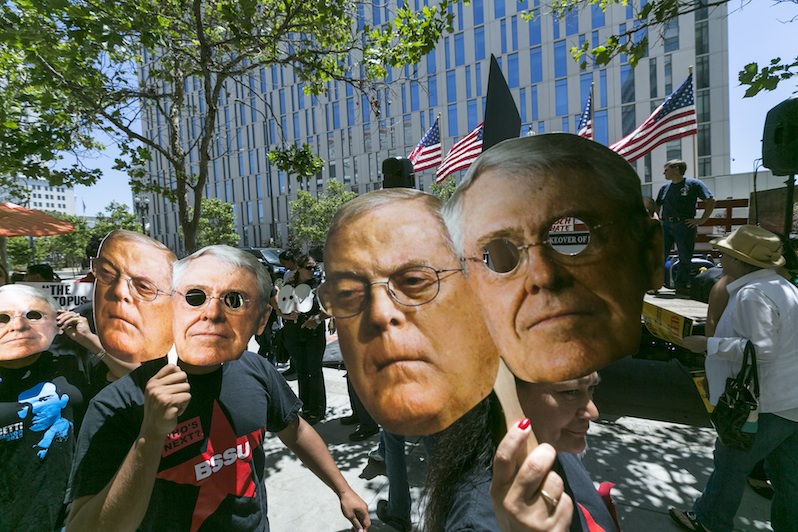 Members of the "Save Our News'' coalition rally to urge Tribune Co. management to reject any offers by the Koch brothers to buy the Los Angeles Times outside the newspaper's offices in Los Angeles in 2013. AP/Damian Dovarganes
Members of the "Save Our News'' coalition rally to urge Tribune Co. management to reject any offers by the Koch brothers to buy the Los Angeles Times outside the newspaper's offices in Los Angeles in 2013. AP/Damian Dovarganes
We may not get a Supreme Court decision in the Hobby Lobby and Conestoga Wood cases that challenge the Affordable Care Act’s contraception mandate until the end of June, but it’s probably not too early to project the biggest winners in the cases: brothers Charles and David Koch. The billionaire industrialists, who helped bankroll the unsuccessful attempt to overturn the ACA’s individual mandate before the Supreme Court in 2012, are also key orchestrators and potential beneficiaries of the campaign to upend the ACA’s requirement that employer-sponsored health care plans include a full range of birth control benefits.
It is, of course, by no means surprising that the Kochs are central players in the anti-Obamacare movement. Since 1977, when Charles Koch co-founded the Cato Institute, the brothers and their foundations have donated over $85 million to help finance an armada of right-wing activist organizations, including well-known advocacy groups and think tanks like Americans for Prosperity and the Federalist Society, as well as more obscure organizations like the National Federation of Independent Business, which served as the lead plaintiff in the individual mandate case, and the Becket Fund for Religious Liberty, a Washington, D.C., public-interest law firm that currently represents Hobby Lobby at the Supreme Court along with former Solicitor General Paul Clement.
But this time around, unlike the failed effort to derail the individual mandate that was thwarted only when Chief Justice John Roberts changed his vote at the last minute, the Kochs and their allies stand to win. In fact, looking at the transcript from Tuesday’s oral argument, it’s hard to see how they can lose.
The long-anticipated argument began precisely at 10:11 a.m. and ran for exactly one hour and 28 minutes, with Clement addressing the court on behalf of both Hobby Lobby and Conestoga. From nearly the outset, the court’s Republican majority (counting the usual silence of Justice Clarence Thomas as an expression of agreement) accepted Clement’s most basic premise — that, legally, for-profit corporations are persons entitled to freely exercise their religious beliefs under both the First Amendment and the Religious Freedom Restoration Act of 1993, a statute passed by Congress initially to protect the rituals of Native Americans but that has since become a litigation catalyst for fundamentalist Christian groups and businesses such as Hobby Lobby and Conestoga.
Under both the statute and the Constitution, Clement argued, his clients had a right to practice their religious beliefs, particularly their anti-abortion principles, by declining to provide health insurance benefits to female employees for contraceptives that they believe can terminate pregnancies — specifically, the “morning after” pill and intrauterine devices. The Obamacare contraception mandate violates those rights, according to Clement.
The three women on the court — Justices Ruth Bader Ginsburg, Sonia Sotomayor and Elena Kagan — tried to expose the gaping holes in Clement’s reasoning, asking to little avail whether a for-profit company could refuse to fund blood transfusions or vaccines for religious reasons. The court’s occasional swing justice, Anthony Kennedy, also expressed some fleeting concerns that a ruling in favor of Hobby Lobby and Conestoga might undermine the legitimate health interests of female workers.
But the most telling remarks of the morning came from Roberts, who in a brief observation about midway through the argument may have tipped his hand as to how the court’s decision ultimately will be crafted. Why not, Roberts asked, simply limit the court’s ruling on corporate religious freedom to small companies like Hobby Lobby and Conestoga that are what he termed “Chapter S” corporations and are “closely held”? The question of whether a corporate right to religious freedom applies to bigger businesses, he continued, could “await another case when a large publicly traded corporation comes in and says we [also] have religious principles.”
As concise and cryptic as they were, Roberts’ comments were seized upon by mainstream reporters like NBC Justice Correspondent Pete Williams, who hailed the chief’s musings as the harbinger of a historic compromise that would restrict any expansion of the corporate personhood doctrine to family-run enterprises and avoid a large-scale impact on women’s reproductive rights. New Republic went even further, featuring a blog comment posted online soon after the argument predicting that after all the hoopla, the Hobby Lobby case “may turn out to be a dud.”
Unfortunately, in all likelihood, the court’s ultimate decision will be neither a dud nor a meaningful compromise. Even if the chief justice’s suggestions are followed, the resulting expansion of corporate religious personhood will be vast, whether the court’s decision is restricted to closely held corporations, or to companies organized under Internal Revenue Code, Chapter 1, Subchapter S, or to both classes.
A closely held corporation is defined as a company in which five or fewer individuals own more than 50 percent of the company’s stock. An S corporation is one that has between one and 100 shareholders and that passes through net income or losses to shareholders so that the company itself avoids paying any federal income tax.Over 90 percent of American businesses operate as closely held corporations, accounting for more than 51 percent of private sector output and 52 percent of private sector employment. Each year, Forbes magazine updates a list of the nation’s largest closely held companies. Ranked No. 1 on the most current list is the agricultural commodities giant Cargill Inc. with 140,000 employees and nearly $137 billion in annual revenue. Ranked No. 2, you guessed it, is Koch Industries with 60,000 employees and $115 billion in annual receipts. Just for the record, Hobby Lobby pulls down the No. 135 spot, raking in $3.3 billion a year and employing 23,000 workers. Conestoga, which is unranked, employs over 950 workers.
Hobby Lobby and Conestoga Wood are also Schedule S companies, as is — you guessed it again — Koch Industries. Other notable S companies include engineering conglomerate Bechtel and multimedia Tribune Co. In total, approximately 4.5 million businesses operate as S corporations.
As long as the court recognizes the right of any for-profit corporation to religious liberty, there will be no way to contain the fallout to what any sane person might regard as small businesses. The right will apply to the minnows and the whales, including two of the primary architects of the relentless corporate personhood crusade, Charles and David Koch.
Your support matters…Independent journalism is under threat and overshadowed by heavily funded mainstream media.
You can help level the playing field. Become a member.
Your tax-deductible contribution keeps us digging beneath the headlines to give you thought-provoking, investigative reporting and analysis that unearths what's really happening- without compromise.
Give today to support our courageous, independent journalists.
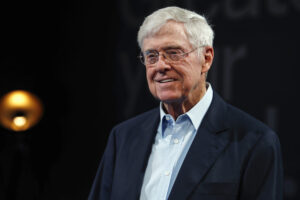
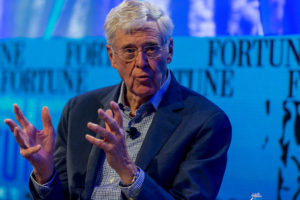

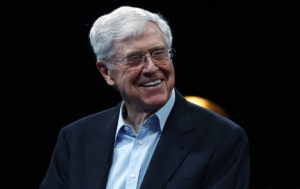
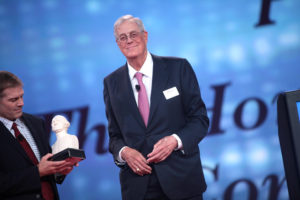
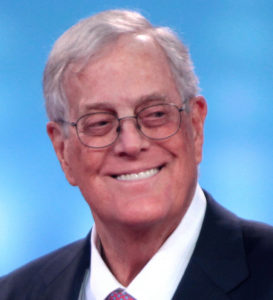
You need to be a supporter to comment.
There are currently no responses to this article.
Be the first to respond.